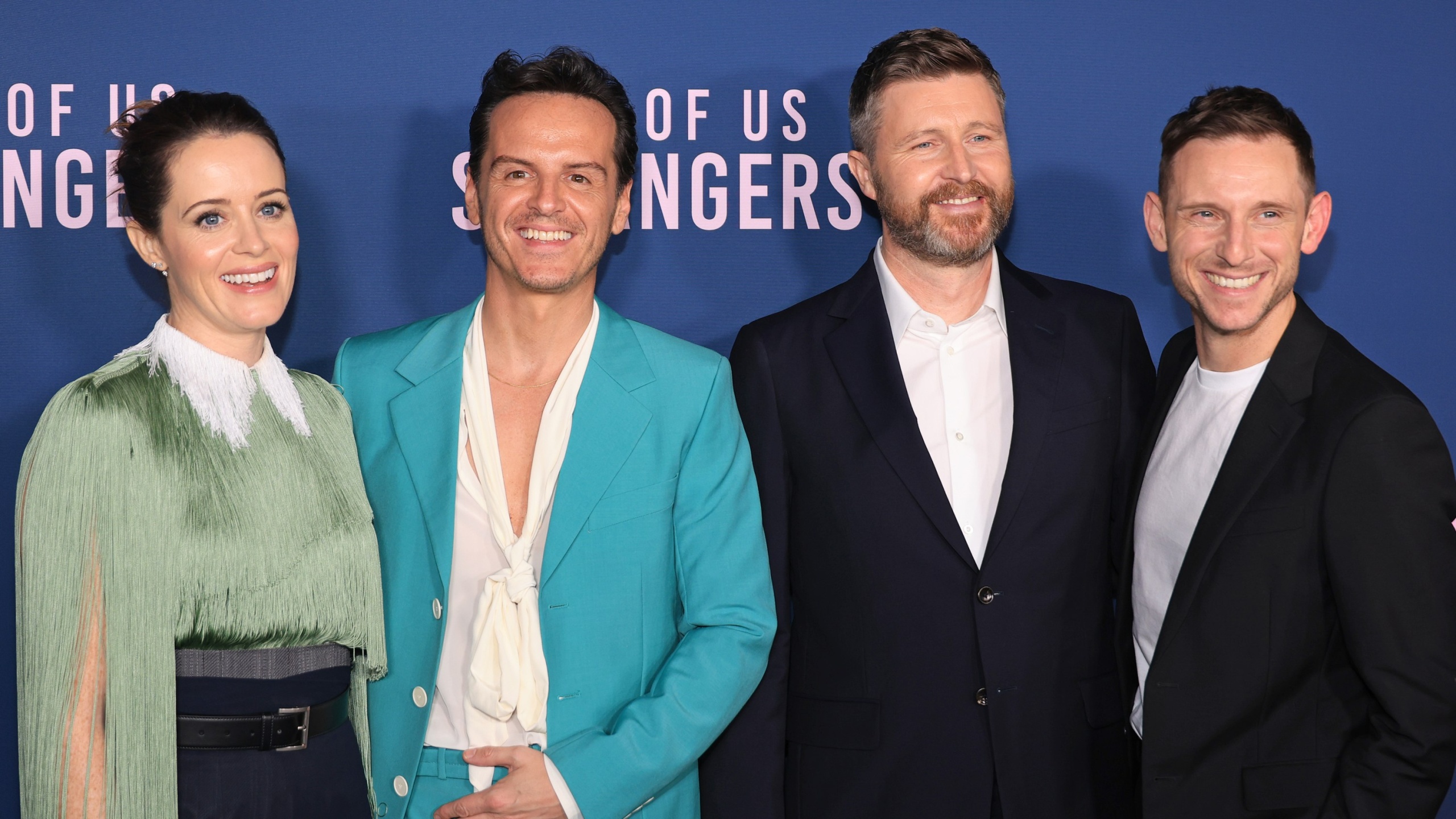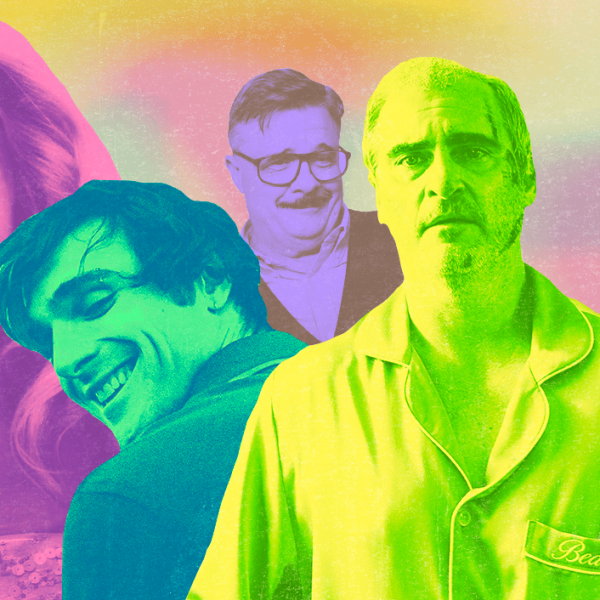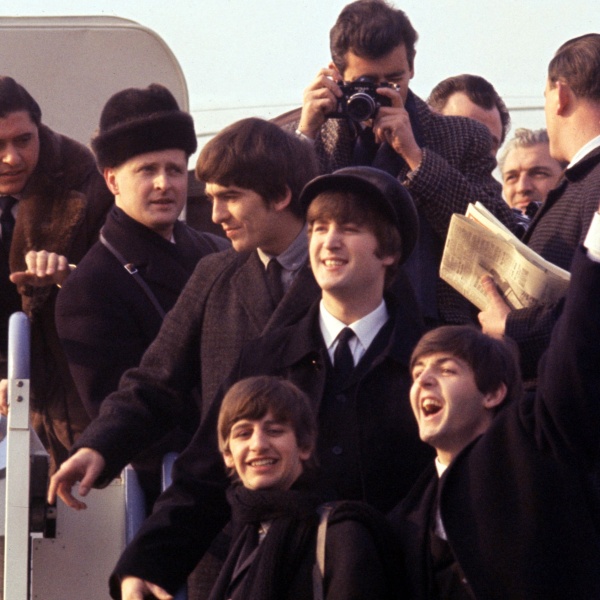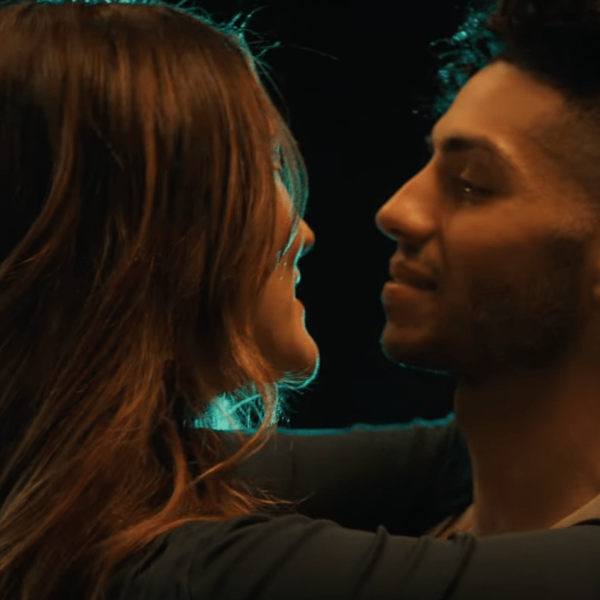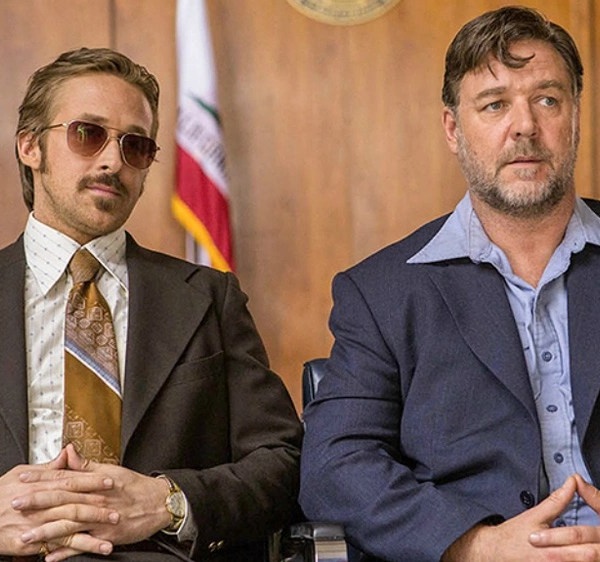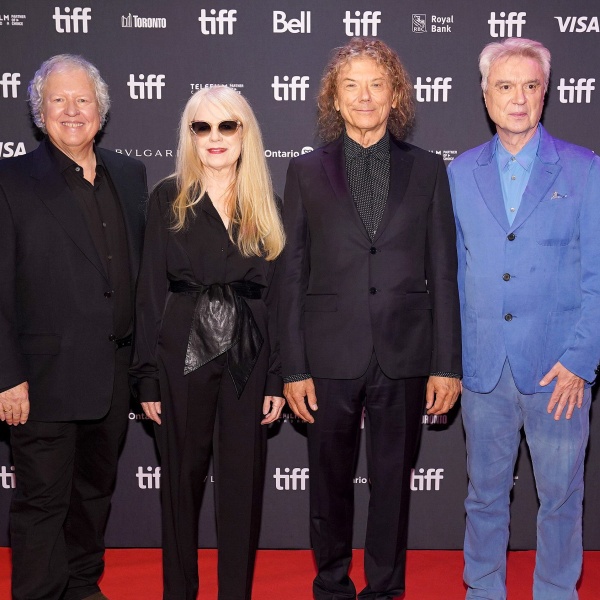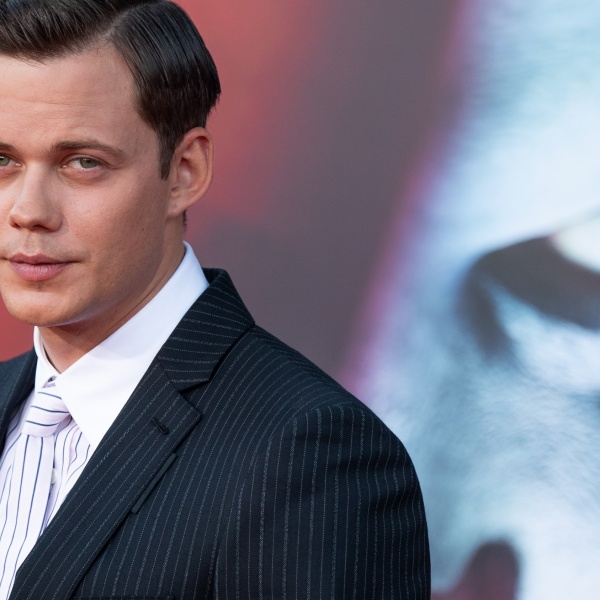
Tucked into the official logline of Andrew Haigh’s heartbreaking “All of Us Strangers” are plenty of intriguing ideas. Mainly, there’s the revelation that Harry’s (played by Andrew Scott) parents are long dead by the time the film opens, and begin appearing to him three decades after they passed away. So stars Claire Foy and Jamie Bell, known simply as “Mum” and “Dad” in the film, are, what? Ghosts? Memories made corporeal? Dreams?
For Foy, those big questions weren’t the most thrilling part of the film. Instead, it was the chance to dive so deeply into a character that, even more than a year since the end of production — the film shot in the summer of 2022 in the UK — she can still conjure up intensely personal alternate realities for a woman literally bound in time.
I met Foy in the restaurant of a Manhattan hotel the afternoon before she was finally set to head home to London after crisscrossing the country on the film’s press tour (she got a Virgin Mary to drink, which struck me as both tasty and smart). The last time we spoke, it was for Damien Chazelle’s “First Man,” in which she memorably declared NASA’s best and brightest (including Ryan Gosling, who played her husband, Neil Armstrong in the film) “a bunch of boys!”
She’s back with still more boys this time around (“I’m always with a bunch of boys. Funny that, isn’t it?,” she said with a laugh), care of a trio of male co-stars in the form of Scott, Bell, and Paul Mescal. She loved it, of course (“I got to tick off a lot of my bucket list actors in this”). It certainly seems like a crazy switch from last year’s “Women Talking,” in which she got to dabble in the rare delight of mostly working alongside women.
“I was embarrassingly excited to be in the film with the three of them,” she said. “I wasn’t a fan girl! I managed to rein it in. There were some definitely very exciting days.” She speaks incredibly highly of all her co-stars, but when asked specifically about Bell, she lit up. “When I heard that Andrew [Haigh] was going to offer it to Jamie, I was just like, oh, my God, I wish I didn’t know that because now if he says no I’ll just be bereft,” she said. “He’s instantly such an open, emotional, kind, funny, just brilliant person. It was instant. I was like, he’s elite. He’s so not a letdown as a person. If anything, he’s just better.”
Haigh adapted the film’s screenplay himself, using Taichi Yamada’s 1987 novel “Strangers” as an entry point into a characteristically personal-feeling story. In the film, Scott’s Adam is a lonely London writer trying to hack his way through a new script, one that sees him returning to his suburban childhood to excavate his memories of his parents, who died when he was just a child (meanwhile, an alluring neighbor, played by Mescal, starts to further draw Adam out of his shell). Soon, Adam starts actually seeing his parents, who look just as they did right before they died, and who are all too eager to spend time with “their boy,” who has years’ worth of pains and pleasures to share with them.
“I can’t speak for writers obviously because I’m not one, but I should imagine everything you write, even if it’s a complete fantasy, you’re putting your own experience into it in the same way as an actor you are,” Foy said. “Regardless of if you’re playing some really fantastical odd character, it is a version of you in some way, or at least you bringing yourself to the character. So I imagine that’s the same with [Haigh].”

That said, she’s quick to note she’s not playing Haigh’s own mother in the film, but of course, the filmmaker infused the screenplay with his perceptions and ideas of motherhood, the kind likely inspired by, yes, his own mother. And he’s the last person to balk at any attempts to drawing connections between the film and his own life. For one thing, Haigh shot the family home scenes at his very own childhood home.
That wasn’t a surprise to Foy, who remembered Haigh telling her about the shooting location the first time the pair met to speak about the film. “Obviously, there were elements where we went, are you mad, or slightly masochistic in some way?” she said. “It added an element of authenticity to it that was already there in the writing. We didn’t need it, but that really worked. The house was a very familiar house to me in the sense that I know people who lived in houses exactly like that. Definitely it felt very personal, but it felt personal anyway, because it’s a small cast. It was a very personal film to me as well, being a mother, being a child of parents, we all are. That’s why he’s so clever.”
While Adam first sees Mum and Dad together, Haigh’s script also offers the trio chances to bond one-on-one. In one of the first scenes in which Adam gets dedicated time with just one parent, he stops by to see Mum, who offers him an afternoon snack in the family kitchen. She’s just enjoying his company, but Adam feels compelled to do something he never got to do when his parents were alive: come out as a gay man.
“The script’s so amazingly written. It’s not expositional. You get to see what the characters are feeling by what they’re not saying,” Foy said. “You get to see that they’re both trying to navigate something that they don’t really have to navigate. She’s coming with defensiveness. He’s coming with defensiveness. It’s not the conversation she was expecting to have, and she’s sort of blindsided by it. Terrified. Feels judged as well for what sort of parent she’s been. I think that’s more honest than a depiction of a scene where everybody says and does the right thing, or is some malicious, evil, cruel character. We all hurt each other in small, minute ways every day.”

That tension between where the scene starts (afternoon snack time!) and ends (with Mum grappling with the gravity of what Adam is telling her) is of utmost interest to Foy. Mostly because it just feels real, fantastical elements and all.
“I’m just really interested in those stories that are trying to basically get to the root of what we do to each other, as opposed to trying to run away from it and present a different kind of more perfect version of who we are,” she said. “We’re all nightmares, and I really enjoyed doing that scene, because I was able to play big ideas in quite a weirdly relaxed way and not be melodramatic about it, but it was drastic. One of the most drastic things in the film. He has to feel like he’s got to come out as a 45-year-old man to his mother!”
The scene also reveals Mum’s own concerns about Adam’s orientation, as rooted in the precise time period she’s stuck in. In her mind, being gay is inextricably linked with AIDS, as the disease was first believed to be (and consistently reported in the public sphere) something only gay men got. When she hears Adam is gay, it’s the first thing she thinks of, and her worries understandably rile Adam, threatening to split their tenuous new bond.
“We also can’t diminish what the ’80s were like for that community: Absolutely terrifying, and also being totally stigmatized,” Foy said. “[It’s this] already completely stigmatized community, and then it just gets more and more worse. … You can’t try and make her some sort of bigoted person, because I think if she had had the opportunity to live now and be a grown-up, a woman in her 60s who has a son who identifies as gay, then I think she would be a very different woman and a very different mother. But she didn’t have that opportunity. It was something that she was denied because she died very young.”

That kitchen scene isn’t the only standout sequence she gets to share with Scott; later in the film, Adam wakes up in the middle of the night and sneaks into his parents’ room to snuggle in bed with them. He gets in next to Foy, while Bell snoozes on her other side, and Haigh slowly brings the camera in to focus just on Mum and Adam. When he pulls back, Mescal and Bell have swapped places, as Adam’s two different realities continue to collide with each other. It was done all in one shot and required a bit of a dance between Bell and Mescal, who had to quietly swap spots in the bed while Foy and Scott have yet another tearjerking heart-to-heart mere inches from their fellow actors.
It was Mescal’s first day on set (“Poor man!” Foy said with a laugh), and everyone seemed just a touch slap-happy about it. “That scene had an element of the ridiculous to it, because Paul had to swap places at the beginning of the scene with Jamie, and that was in my eyeline,” Foy said. “It was the most amazing contemporary dance I’ve ever seen in my life, with dead-serious faces. They were both terrified of making any noise doing it. I laughed far too many times in that scene, I think.”
And it was one of Foy’s favorites to shoot, the kind of thing she always wants to do.
“I love that scene because it was just us, me and Andrew, in a bed together, just close whispering to each other. It was uninterrupted and you got a real chance to act,” Foy said. “Those are my favorite things to do. My favorite thing to do is to be a character alone in their room because you just get to do it. You just get to do what you want to do, do acting, and I just love it. It was such a beautiful thing. I love doing that.”

Foy isn’t the only person dreaming up alternate realities for the characters of “All of Us Strangers,” and when asked about how some audiences have offered up different opinions on “what it all means” or even “how it all ends,” she’s thoughtful.
“I think people struggle with ambiguity, don’t they, in a way?” she said. “It’s the sign of an amazing filmmaker that different ideas about the film can all exist at the same time. I have my idea, especially about the ending of the film, about it being [sort of] a ‘Sliding Doors’ kind of thing. Here’s what could have happened, here’s what did happen. All of those options are true. All of those can exist in the same universe, the same way that your parents can be alive in the same universe, even though they’ve died.”
Appropriately enough, at least given the material at hand, Foy gets a little metaphysical when talking about her own theories on the film and life itself.
“It’s no weirder that we live on a planet that’s in a solar system where we have souls, and also bodies that die, and we can dream about things and they feel like they’re real, and our heart can pound,” she said. “All of that to me is in the human experience, pretty out of the ordinary. So the idea that his parents are there in front of him and they’re very real for him, I don’t find that hard to get my head around that, but I get that other people need it to be literal. They need it to be ‘this is what’s happening,’ and there’s some limit to it. It’s not some strange film about people being alive and dead at the same time.”
But it’s the earthbound conversations, the concrete stuff, that really seems to get to her.
“The film has a real potential in more ways than one,” she said. “Andrew Scott has [talked] about the fact he never thought he would play falling in love in a film. He never thought that he would get to be a character who is gay but is also dealing with things other than just the fact that he’s gay, the fact that he’s a gay man does not mean that that’s what the film’s all about. Also the fact that he gets to do sex scenes; he never thought he’d get to do sex scenes. And if he did get to do a sex scene, he never thought that sex scene would be in a loving, tender, falling-in-love kind of story. … Imagine a 16-year-old boy seeing this film now. If Andrew had seen it, it could have completely changed his life.”

Going out and talking about the film has reminded Foy intensely of the press tour for “Women Talking,” during which people (audiences, journalists, fellow actors) would share all sorts of personal stories with her because they were so moved by the work she’d done onscreen.
“I was having conversations where I was like, oh, my God, I’m being given information, or being included in the conversation I’m pretty sure I’m not qualified to be dealing with, but I’m so honored to be on the receiving end of it,” she said. “This film feels exactly the same in a way, that people are sharing things with me. I feel so honored that people feel, because I’ve been in this film, that they want to be able to express that and talk about it [with me].”
Foy paused, leaned back, and sighed. “Just, I mean, what a lucky person I am to do this, basically,” she said.
Searchlight Pictures will release “All of Us Strangers” in theaters on Friday, December 22.
